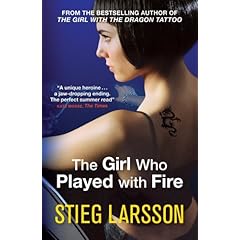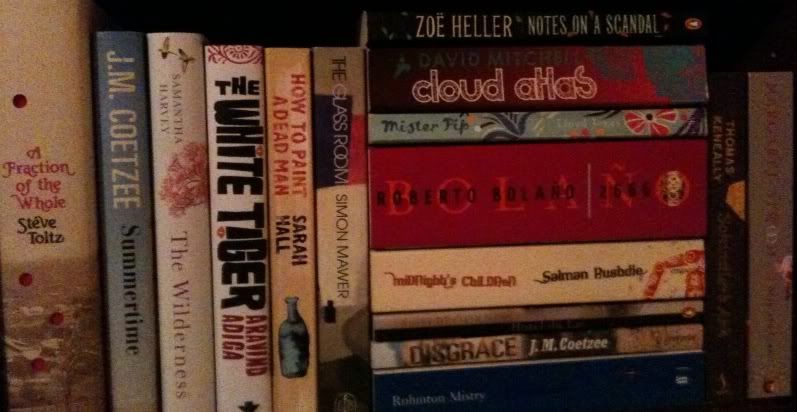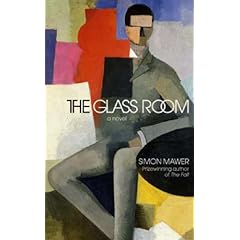 The Girl Who Played With Fire is the second book in Stieg Larsson's Millennium trilogy, starring Lisbeth Salander and Mikael Blomkvist. The tables have turned though, and while last time Mikael was on the wrong side of the law, this time it's Lisbeth.
Lisbeth has had her share of trouble with the law before, but, since, she's presumably cleaned up her act, and is not as prone to spontaneous acts of stupidity as she once was. That was thanks to the careful guidance of her guardian, Palmgren. Since his stroke, the baton passed on to the despicable Bjurman, who had sexually assaulted Lisbeth in the previous book, and Lisbeth sought revenge - however, she didn't go to the cops with her problems, but took matters into her own hand.
The Girl Who Played With Fire is the second book in Stieg Larsson's Millennium trilogy, starring Lisbeth Salander and Mikael Blomkvist. The tables have turned though, and while last time Mikael was on the wrong side of the law, this time it's Lisbeth.
Lisbeth has had her share of trouble with the law before, but, since, she's presumably cleaned up her act, and is not as prone to spontaneous acts of stupidity as she once was. That was thanks to the careful guidance of her guardian, Palmgren. Since his stroke, the baton passed on to the despicable Bjurman, who had sexually assaulted Lisbeth in the previous book, and Lisbeth sought revenge - however, she didn't go to the cops with her problems, but took matters into her own hand.
Now, Bjurman is found dead, as are two friends of Mikael (Dag Svensson and Dag's girlfriend, Mia Johansson), who were working on an expose about sex trade and trafficking, for the Millennium magazine, which would ruin the reputation of various people in high places. Before his death, Svensson had informed Mikael of a new lead: Zala, a mysterious powerful stranger, who no one was willing to talk about. Lisbeth, who had been travelling for a few months prior to these murders, hacked into Blomkvist's computer, and saw the references to Zala - a bad memory from her own troubled and disturbed past.
When Lisbeth's prints are found on the gun, she is assumed to be responsible for all three murders. With a history of being violent, and having trouble with the cops, is it wrong to suspect her? Specially, as she was at Dag's and Mia's place just before the double murders occurred. Everyone is out looking for her, with only one person voicing his unequivocal belief that Lisbeth is innocent: Mikael Blomkvist - who doesn't even know how to get in touch with her! Lisbeth has cut off Blomkvist completely, and changed her phone number and address.
Coincidences run deep as Mikael and the rest of the Millennium crew carry out their own investigation, side by side with the cops. The Millennium crew are working on the assumption that the murders are a result of the controversial subject the couple were working on, whereas the cops have their "suspect" but lack the motive. Will the Millennium crew determine the real culprits, and find Zala, or will the cops find Lisbeth Salander, who seems to have dropped off the face of the planet?
This book is suspenseful - a page turner, if you like. Again, we come face to face with the darker side of the Scandinavian country, as well as find out the past of Lisbeth Salander, and what "All The Evil" was, that led her to become the tough-as-nails law-averse headstrong girl that she is.
The coincidences present in this book are convenient, to say the least - what are the odds that Mikael will be working with two people who are out to find a central person in Lisbeth's past? And how does Mikael conveniently be the person to take a call that gives them their biggest break?
With respect to the language and product placement, my complaints about this book are pretty similar to its predecessor. The Apple product placement is still all too rampant, as is the writing extremely descriptive.
She walked gingerly into the 7-Eleven where she bought some shampoo, toothpaste, soap, kefir, milk, cheese, eggs, bread, frozen cinnamon rolls, coffee, Lipton's teabags, a jar of pickles, apples, a large pack of Billy's Pan Pizza and a pack of Marlboro. She paid with a Visa card.
However, just like The Girl With The Dragon Tattoo, this book's definitely worth a read, as the characters of Lisbeth and Mikael transcend the pages, with their individuality, sense of morality and loyalty, sheer intelligence, heavy conscience and utmost bravery.
Rating: B
 Girl, Missing is a story about Lauren, a fourteen year old, who lives in London with her parents. She knows she is adopted, and when she is forced to deliberate on "Who am I?" as part of her school homework, her curiosity in her past increases threefold.
Logging on to a website, Missing-Children.com, she finds an American girl who went missing a couple of months prior to her adoption. The photograph resembles her, but, Lauren isn't sure. Her foster parents are refusing to disclose any information as she isn't old enough, but Lauren is desperate to find out more about where she comes from. And - did her parents kidnap her from the American family? Has she even been kidnapped?
Girl, Missing is a story about Lauren, a fourteen year old, who lives in London with her parents. She knows she is adopted, and when she is forced to deliberate on "Who am I?" as part of her school homework, her curiosity in her past increases threefold.
Logging on to a website, Missing-Children.com, she finds an American girl who went missing a couple of months prior to her adoption. The photograph resembles her, but, Lauren isn't sure. Her foster parents are refusing to disclose any information as she isn't old enough, but Lauren is desperate to find out more about where she comes from. And - did her parents kidnap her from the American family? Has she even been kidnapped?
 If you love the Twilight books, I suggest you don't continue reading this review, despite the fact that it's going to be a really short one. Nope - I didn't enjoy the book, and worse, I didn't see any point to it. I struggled to page 279, and then, I just gave up. On one hand, I do congratulate myself for getting that far, but on the other, I berate myself for wasting that much time. The saving grace is, I didn't buy the books, but borrowed them from a friend, and she's going to get three of them back completely untouched.
So, the "story" in a nutshell:
If you love the Twilight books, I suggest you don't continue reading this review, despite the fact that it's going to be a really short one. Nope - I didn't enjoy the book, and worse, I didn't see any point to it. I struggled to page 279, and then, I just gave up. On one hand, I do congratulate myself for getting that far, but on the other, I berate myself for wasting that much time. The saving grace is, I didn't buy the books, but borrowed them from a friend, and she's going to get three of them back completely untouched.
So, the "story" in a nutshell:
 For twenty four years, Daphne Du Maurier has eluded me, and I'm still trying to figure out how! I read
For twenty four years, Daphne Du Maurier has eluded me, and I'm still trying to figure out how! I read  I stumbled upon The Robber Bridegroom in a second hand bookstore, and was intrigued immediately, by the quote on the cover:
I stumbled upon The Robber Bridegroom in a second hand bookstore, and was intrigued immediately, by the quote on the cover:

 Peter Carey, an Australian novelist, is one of only two authors to have won the Booker Prize twice, for the works
Peter Carey, an Australian novelist, is one of only two authors to have won the Booker Prize twice, for the works  The Girl Who Played With Fire is the second book in Stieg Larsson's
The Girl Who Played With Fire is the second book in Stieg Larsson's 



 I just about finished the
I just about finished the